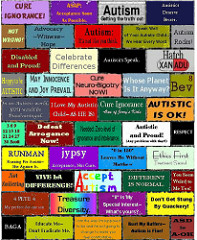“Oh, that happens to everyone,” she replied, totally fluffing off my explanations of why it was hard for me to follow just one speaker in a room full of talking people, and to understand what was being said.
“That happens to me sometimes, and I don’t have a problem with it,” he replied, and turned back to reading his journal. My explanation had been summarily dismissed as nothing more than an excuse, and my presence was likewise dismissed.
There are a number of ways that a majority can oppress a minority, beyond the more overt outright exploitation (uneven benefits from the result of work done by some) or violence (previously discussed with regards to hate groups, here). There are the more covert means by exclusion or marginalisation (previously discussed regarding “othering” here), abusing privilege (previously discussed here), and cultural dominance (sometimes referred to as a cultural imperialism) where the “other” serves as the negative example. Part of being the majority or the minority comes from how each are identified, what methods are used to create and re-affirm those identities, and how the groups react to each other in more highly stereotypical or exaggerated ways to create that schismogenesis.
In the cases described here, the marginalisation occurs by denial and dismissal. The disability can’t really exist because it’s not obvious; it’s an invisible disability. It’s also not so extreme that ordinary (“normal) people can’t relate to it.
We try to present and explain difficulties because want people to be able to relate to ourselves and our problems, and to gain some sense of common ground and empathy. But sometimes this backfires because their denial and dismissal turns the issues into not-real problems. Instead of reasons, somehow all we have are excuses.
Not only that, but we’ve lost social standing. We’re been shoved to the fringe, no longer equals but minors who are merely tolerated, feeling like children appealling to parents, students appealling to principals, workers appealling to bosses. We feel demoted, as though we’re trying to “prove” something to regain status.
Somehow the other person has turned themselves into the exemplar, and the measure against which everyone else is judged. If they don’t have a problem with it, then no one else should either.
Sure, everyone experiences problems. But for those with Auditory Processing Disorder, or faceblindness, or any number of issues, it’s a matter of frequency, intensity and duration. Processing or performance speed-bumps happen repeatedly throughout the day. They can cause considerable issues in work, in school, socially, and at home. Generally the disability has always been a problem, even if the cause was not formally identified for years. The problems created by invisible disabilities are not isolated incidents, but repetitive issues that dramatically affect how one approaches endeavours in life.
Denial and dismissal are frequent strategies used (often unconsciously) by others to not have to deal with invisible disabilities. What the hell for? What purpose does this serve, aside from perhaps bolstering someone’s ego by letting them feel “superior” in some way?
Well, if one can pretend that others don’t really have disabilities or that such aren’t even real, then one doesn’t have to do anything to accommodate the other person’s needs. There’s no effort necessary to be made, there are no changes have to be made, and any problems that the disabled person has are strictly their fault.
Neat and tidy little package, innit?
::sigh::
Advocacy is not a single event. It’s a journey, a long haul. Thankfully, it need not be undertaken alone.








Roaming Around « Aw Diddums said,
3 September 2008 at 13:46
[…] “You’re dismissed” (Andrea’s Buzzing About) […]
David N. Andrews M.Ed. (Distinction) said,
6 July 2007 at 15:05
“What purpose does this serve, aside from perhaps bolstering someone’s ego by letting them feel “superior” in some way?”
I think that might actually be it.
The social psychological phomenon of social comparison is at play: the majority group needs to feel good about itself, but cannot be arsed to do anything to improve itself, so it disparages a minority – any minority – in order to get away with making a downward social comparison against that minority. Groupthink phenomena get in the way of anyone with a conscience rocking the boat and such persons are then treated in the same manner as the original target group.